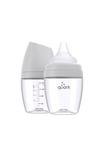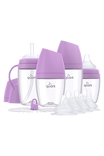Bringing home a newborn can be one of the most beautiful and sacred transitions in life. And while those early days are often filled with snuggles and awe, they’re also marked by sleepless nights and sometimes an endless cup of coffee. If you’ve ever wondered how to support healthy sleep habits in the newborn stage—without ignoring your baby’s need for closeness—you’re not alone.
Let’s take a deep breath together:
Inhale for 4 seconds
Hold for 4 seconds
Exhale for 4 seconds
Hold for 4 seconds
What we just did is called “Box Breathing,” and I have used it more times than I can count while caring for newborns. Now that our amygdala is a bit calmer and maybe feeling less triggered into fight or flight, let’s explore how newborn sleep and feeding are intertwined, and what you can gently do to set yourself and your newborn up for success.
Understand What’s Normal First
Newborns don't have a circadian rhythm until about 3-4 months, yet there is no up-to-date research that details the evidence of their changes in sleep behaviors. You may notice a drastic change in sleep hygiene, and that can be a telling sign. Newborns often have their days and nights flipped, and sleep can feel unpredictable at times. It’s biologically normal for them to wake frequently, especially to feed (No, you are not doing anything wrong, mama). Their tummies are tiny—about the size of a marble at birth—so they need regular nourishment around the clock.
Knowing this can help you release the pressure to “fix” sleep early on. Instead, think of this stage as laying the foundation for healthy rhythms to grow in time. Newborns have short wake windows so they will sleep a majority of the time in a 24-hour span. They wake to feed, cuddle, or ask for a fresh diaper.
Rather than pushing for long naps or uninterrupted nighttime sleep, focus on responding to your baby’s cues. This builds trust, supports emotional development, and sets the stage for longer stretches of rest in the months ahead.
Feed Often—and Responsively
Frequent feeding (whether breast or bottle) supports both growth and sleep regulation. A well-fed baby tends to sleep more soundly and settle more easily. Try feeding when your baby shows early hunger cues like rooting, sucking on hands, sticking the tongue out, or becoming more alert. Waiting until they cry can make feeding more difficult and may disrupt sleep even further. Crying is a late sign of hunger.
Cluster feeding in the evening is also normal. Many babies “tank up” before a longer stretch of rest. This is not a bad habit, but a survival tool built right into your baby’s design. Studies show that babies who feed more frequently in the evening often get their longest stretch of sleep afterward.
If your baby seems to doze off mid-feed, try a gentle burp and re-latch, or a diaper change to wake them. If you are breastfeeding, you can try to squeeze your breast, “breast compression,” to release a “surge” of milk to potentially wake your newborn up. Ensuring a full feed can sometimes help them sleep a bit longer between wakings.
Pro Tip: If feeding is challenging, reach out early to a lactation consultant or feeding support provider. Comfortable, efficient feeds can make a world of difference for both sleep and sanity.
Set the Scene for Rest
While your baby won’t follow a strict schedule yet, you can start shaping sleep-friendly patterns that gently guide their rhythm over time.
“Well, how do I do that, Amanda?!?” Let me tell ya!
- Expose your baby to daylight during the day. Open the curtains and go for a short walk if you’re able. Natural light helps kickstart circadian rhythm development.
- Keep nights calm and dim. Use a soft night light, keep voices low, and avoid stimulation during nighttime feeds and changes. This contrast between day and night helps the baby learn the difference. Be mindful of your blue light from an electronic device during this time as well.
- Use soothing rituals. A short, gentle routine (like a warm bath, feeding, lullaby, and swaddle) helps signal to your baby that it’s time to rest. Switch to a safe sleep sack when your little one shows signs of rolling over. Typically 3-4 months, but I have seen it start earlier!
- You might also begin to notice natural patterns in your baby’s behavior-times of the day when they’re more alert, fussy, or drowsy. Lean into these rhythms rather than resisting them. It will save you energy and help your baby settle more peacefully.
Prioritize Safe Sleep
It’s so important to create a safe sleep environment from day one. Not only does this reduce the risk of Sudden Infant Death Syndrome (SIDS), but it also helps you rest easier knowing your baby is protected.
- Always place your baby on their back to sleep.
- Use a firm, flat sleep surface like a crib or bassinet with a tight-fitting sheet.
- Keep the sleep space free from soft items like blankets, toys, bumpers, or pillows.
- Share a room (but not a bed) for at least the first 6 months, as recommended by the American Academy of Pediatrics.
- Avoid overheating—keep the room cool, and dress the baby in breathable layers.
A wearable blanket or sleep sack can be a safe and cozy alternative to loose blankets. And again, if you’re swaddling, stop once your baby shows signs of rolling.
Watch for Sleepy Cues
Overtired babies can be harder to settle, so learning your baby’s sleepy cues is incredibly helpful. These might include:
- Yawning
- Rubbing eyes
- Staring off
- Slower movements
- Fussiness that builds gradually
Try offering sleep before your baby becomes overtired. In the newborn stage, wake windows (the time they can stay comfortably awake) are often only 45 minutes to 90 minutes long. Keeping an eye on these windows and offering naps regularly can make a big difference.
Grace for You and Baby
In a culture that often glorifies sleeping through the night as the ultimate parenting badge, it’s easy to feel like you're doing something wrong when sleep is fragmented. But the newborn stage isn’t about perfect routines. It’s about attachment, nourishment, and getting to know your new babe. You are doing holy work, even when it’s hard.
One day, the long nights will be a distant memory. But the trust you’re building now? That WILL last a lifetime.
Key Takeaway
Supporting healthy sleep in the newborn stage isn’t about strict schedules or sleep training. It’s about gently guiding your baby’s natural rhythms through responsive care, nourishing feeds, and a peaceful environment. If you ever feel unsure, overwhelmed, or just need a listening ear, reach out. You weren’t meant to do this alone.
After all, every good thing, including rest, starts with being deeply seen, fully supported, and reminded that you are not failing. You’re in the newborn season.
And you’re doing beautifully.
If you need further support, please reach out on my website using this link. I would be honored to support you either in person if you are local in Arizona State, or virtually throughout the United States.






















Laisser un commentaire
Tous les commentaires sont modérés avant d'être publiés.
Ce site est protégé par hCaptcha, et la Politique de confidentialité et les Conditions de service de hCaptcha s’appliquent.